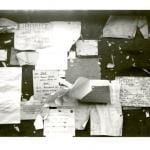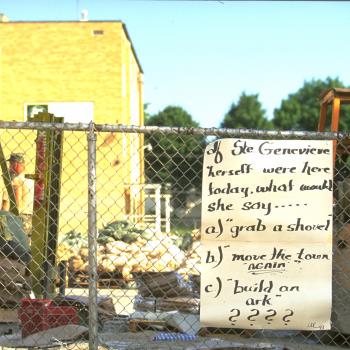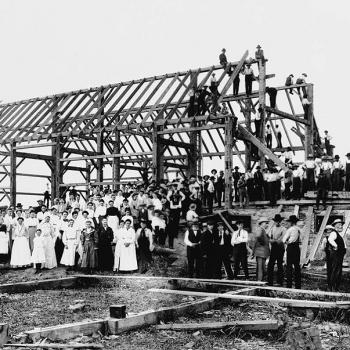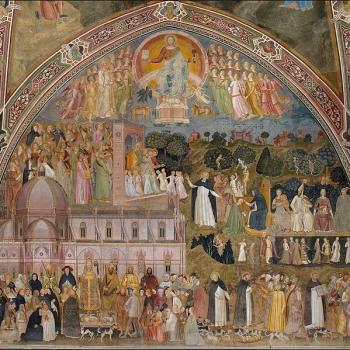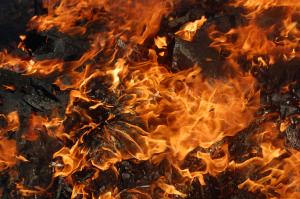
It has been a hard weekend in this corner of Green Ridge.
On Saturday night, just as I began to say my prayers, the fire siren began to sound. The noise broadcasts as loudly as the tornado siren, filling the whole town and calling the volunteer firefighters to assemble. When our family hears it, we always stop to say an Ave. But I was the only one awake. I prayed quietly and then went about my business. It was only an hour later that I noticed an unusual amount of traffic on our gravel lane. We don’t get passersby. There are days when the only vehicles are those of our family, our neighbors, and the mailman. But here was car after car after car, three in a row. I went to the front window.
The fire for which the alarm had sounded was in my neighbor’s barn, just around the corner, clearly visible from my house. The barn is a large, corrugated metal building that was once a warehouse. The current owners use it for storing farm equipment, grain, fertilizer and hay. Now smoke was rolling end to end through the building, urged on by a light breeze. I stood on the front porch and prayed as the men shouted and the red and blue lights of firetrucks flashed. Finally, I went to sleep. When I woke in the middle of the night, the volunteer firefighters were still there. And still there again Sunday morning, looking blank and tired-eyed.
The structure is a mess. Most of the farm equipment was saved, but giant sopping piles of alfalfa hay are sitting in the middle of the road, periodically reigniting to send acrid smoke wafting through town. Sections of the gray metal building are scorched rusty black. All of its windows have been broken out, intentionally, the owners say. The family reports that the fire has been declared an arson. The perpetrators vandalized the building after setting it alight. They stole another neighbor’s truck before they disappeared.
I am angry. Almost as angry as if it were my own barn. This is my neighborhood, my little town. These are my neighbors. We wave at them when we walk by on the way home from school. I buy milk and pork from the farmer’s wife at the market. I know in my own heart and soul every last bit of work and worry that goes into planting, mowing, baling, harvesting, buying, selling, storing. Each bushel of grain or round bale is more than just a dollar figure in a list of items to be replaced by an insurance company. Every one is brought into being by the literal mud, blood, sweat and tears of a farmer who stewarded them from planting to plucking up. I can feel the sunshine that grew them on my own back just as well as I can smell them burning now. That farmer is my neighbor, but he could just as well be my father.
On Monday, a controversy over COVID vaccination prompted Twitter user @WB_Baskerville to remark: “Americans basically regard their neighbors with fear and hatred. It shows up in our politics, our culture of violence, our response to the pandemic, and in many other ways. I don’t know how you come back from that.”
I don’t know how you come back from it, either. But I know how you keep from losing it in the first place. You must trust your neighbor. To trust your neighbor, you must love your neighbor. Rejoice when he rejoices. Mourn when he mourns. To love your neighbor, you must know your neighbor. You must know him and his work as well as you know your own father.
This was also the lesson of my pastor’s homily last Sunday. Abraham, Father explained, was able to trust fully even when God seemed to demand something terrible: the sacrifice of Abraham’s beloved son. This trust was not miraculously infused. It was built upon long years of relationship between Abraham and the Lord, from the time he was called out of his own country, to his settlement in Hebron, to the fulfillment of God’s promise to him and Sarah. The Lord had been there while Abram worked and played, rejoiced and suffered. They were neighbors. Abraham knew him as he would know a family member. As he would know his father. This deep knowledge of the Lord allowed Abraham to love Him, and finally, to trust Him, even when His command seemed incomprehensible.
In this country, in this era, we become more and more isolated with each passing year. Many of us are afraid to get to know our neighbors. As the story of Abraham shows us, this is the path that opens us up to pain. Those who know us have the power to make demands of us. They can confuse and frighten us. They might even wound us, building fires that threaten to consume everything we love. But this knowledge is also the only path to love and trust. We cannot love what we do not know.
This is the hard beauty of a community where everyone knows everyone else. We are close enough to light each other’s lives on fire, but we are also close enough to drop everything at the siren’s call, working far into the night to put them out. We are close enough to wound each other. But we are also close enough to feel each other’s wounds. We feel the sun on our backs that grows our neighbor’s grain and the tangled roots that we share in the same small patch. We are the body of which St. Paul spoke: ”if one member suffer any thing, all the members suffer with it; or if one member glory, all the members rejoice with it.”


